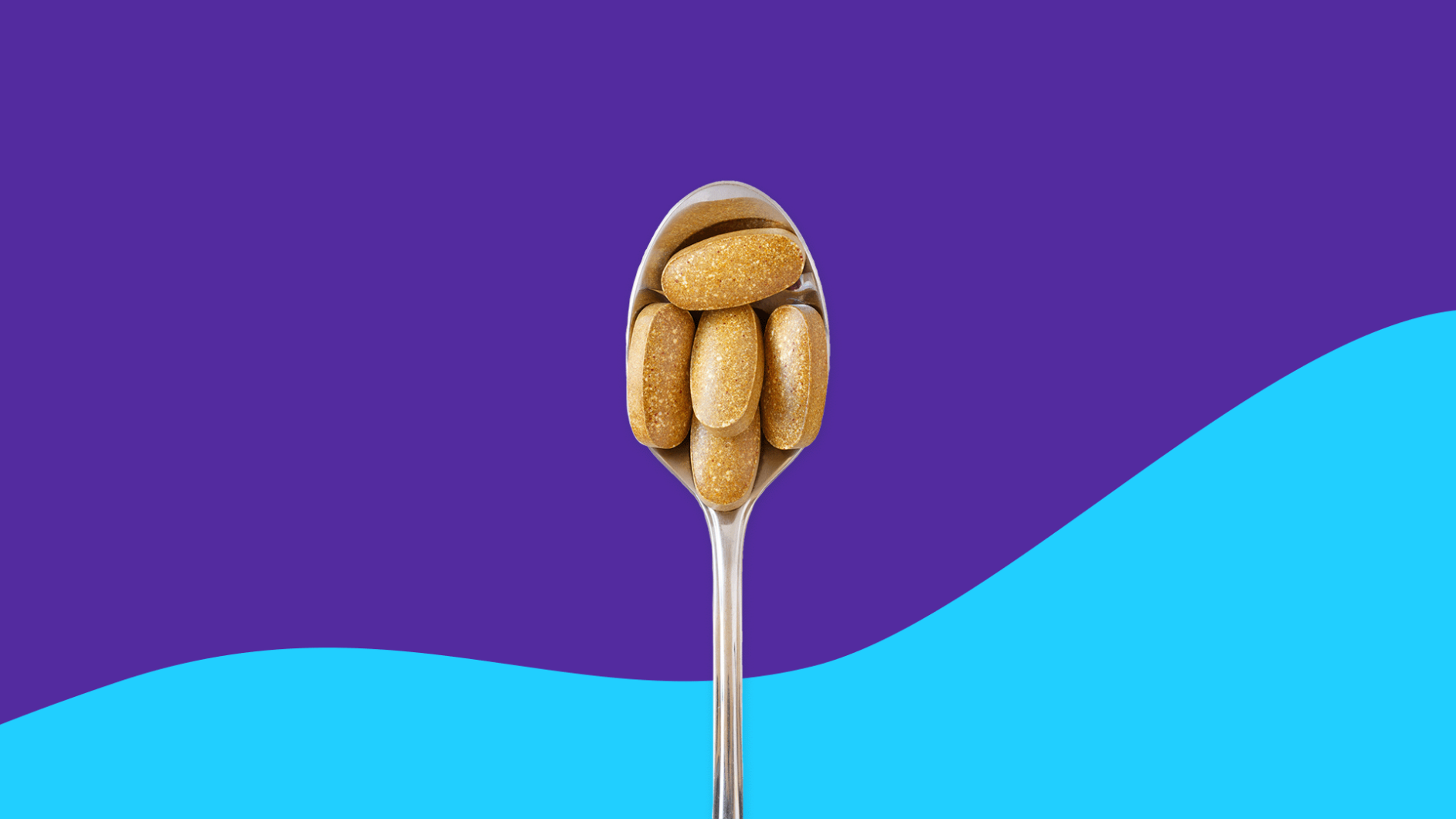If you’ve heard about the potential healing properties of mushrooms, you may be curious about the popular “lion’s mane” mushroom, also known by its scientific name, Hericium erinaceus. This wild mushroom, which resembles a hedgehog, has long spines and typically grows on hardwood trees, usually by itself or in small groupings. The fruiting body of the mushroom can grow up to 15 inches wide.
Lion’s mane has been used in traditional Chinese medicine for thousands of years in the treatment of a wide variety of conditions, including insomnia and gut problems. We’ll detail the potential health benefits of lion’s mane supplements, the forms in which they’re available, and what to consider before taking them.
8 lion’s mane benefits
Lion’s mane is reported to have a number of health benefits.
1. Regulates blood sugar
Lion’s mane may help people with diabetes keep better control of their blood sugar levels. Some research has shown that extract of Hericium erinaceus has been shown to lower blood glucose levels in animals with diabetes. The protective effect did seem to depend on the dose, however.
2. Regulates cholesterol
Lion’s mane mushroom extract may be useful in helping regulate cholesterol levels. Research published in the journal Bioscience, Biotechnology, and Biochemistry suggests that it may help lipid metabolism, which could help reduce cholesterol levels.
3. Helps protect brain function
Lion’s mane might help with brain function and possibly ward off cognitive decline. “In fact, this seems to be one of the most popular reasons for embracing lion’s mane,” says Tod Cooperman, MD, founder of Consumer Lab, which conducts independent testing of supplements.
According to a recent study published in the journal Antioxidants, extracts of the Hericium erinaceus mushroom have neuroprotective effects, which raises hopes that it could be helpful for thwarting neurodegenerative diseases like Parkinson’s disease and Alzheimer’s disease. Much more research is needed to confirm that, however. Another small study published in Psychotherapy Research found that people with mild cognitive impairment who took four 250 mg tablets three times per day for 16 weeks showed more improvement in scores on a cognitive function test than participants who only took a placebo. Those results suggest that lion’s mane might be helpful in treating mild cognitive impairment.
4. Reduces inflammation and inflammatory diseases
Lion’s mane mushroom also has anti-inflammatory effects. It may even be capable of fighting off damage to the liver caused by heavy alcohol use, according to a study that examined the effects on mice with liver injury from alcohol exposure. Other studies in animals have found that extract of Hericium erinaceus (or products containing lion’s mane extract) reduced the inflammatory activity of some inflammatory bowel diseases like ulcerative colitis.
5. Combats symptoms of depression
Research also suggests that taking lion’s mane supplements might reduce some of the debilitating symptoms of depression, like fatigue, persistent sadness, hopelessness, difficulty concentrating, and loss of interest in daily activities. A recent literature review in the International Journal of Molecular Sciences found that although more research is needed into the specific mechanisms, lion’s mane mushroom could have some therapeutic effects in relieving depression and helping people feel better.
6. Helps treat digestive diseases
People have relied on edible mushrooms like the lion’s mane mushroom for centuries to treat certain digestive diseases. For example, a bacterial infection known as Helicobacter pylori (H. pylori) can cause stomach pain, weight loss, and even bloody vomit. Some studies in animals have found that Hericium erinaceus extracts may be able to inhibit the growth of that bacteria, which could also reduce gastric ulcers.
7. Supports the immune system
Boosting the immune system is a popular reason for consuming lion’s mane mushrooms. A study published in Frontiers in Immunology about the use of Hericium erinaceus in mice with tumors showed promising results for the use of this extract in modulating the immune system.
8. Promotes recovery from injuries to nerves
Lion’s mane may have the potential to help treat nerve injuries and regain some function. A group of researchers studied extract of the fruiting body of Hericium erinaceus in rats with nerve injuries. They found that the injured rats who took the lion’s mane mushroom extract seemed to regenerate some nerve cells (axons), and the injured rats recovered some function in their affected limbs.
Myths about lion’s mane health benefits
Lion’s mane is not a “magic mushroom.” It does not contain the psychoactive ingredient psilocybin, which can cause hallucinations.
How to take lion’s mane
There are a variety of ways to take lion’s mane supplements, including capsules and tablets, tinctures, and powder. Lion’s mane mushrooms are also available in dried and raw forms, which can be cooked and eaten.
There’s no universally recommended dosage amount, so recommended dosage amounts depend on the form of the supplement, the purpose, and the consumer’s age and health.
For example, one study found that 1,200 mg per day for eight weeks helped study participants who were obese or overweight realize improvements in sleep disorders, anxiety, and depression. Meanwhile, a different study found that cognitive function was improved among people who consumed about 3 grams of lion’s mane per day for 12 weeks.
Capsules and tablets
Lion’s mane capsules and tablets are available in a variety of amounts. Universal dosing recommendations have not been established, since research is limited and potency varies by mushroom.
Tinctures
Lion’s mane mushroom tinctures are also available. A tincture is essentially a concentrated herbal extract that’s taken orally, usually with a dropper, to deposit the liquid on the tongue.
Mushroom powder
Lion’s mane mushroom powder can be purchased online or in stores. It can be mixed into hot water, tea, or other beverages such as smoothies or coffee.
Psychonutritionist Shawn Talbott, PhD, CNS, LDN, notes that it’s also possible to take a tea made of dried mushroom powder and dry it back down to a more concentrated powder. “With this approach, you would only need to take about 100 mg of the concentrate, but with the original whole mushroom powder, you would need to take at least ten times more (1000 mg),” Dr. Talbott says.
What to consider before you choose a lion’s mane supplement
As to the best way to take lion’s mane supplements, that may be up for debate.
“This is always a tough one with mushroom supplements because a lot of the products on the market are simply powders of the fruiting bodies—the above-ground part of the mushroom that is simply dried, ground, and placed into capsules and powder blends,” Dr. Talbott says. “In this form, you generally get a very low-potency product that may or may not work.”
A supplement package may claim it contains lion’s mane mushroom, but it may not specify what part of the mushroom it’s made from. Dr. Cooperman explains. It could be made from the fruiting body on top, or it could be made from the mycelium, the bottom structure of the mushroom that resembles roots. Dr. Cooperman warns consumers not to place too much trust in lion’s mane supplement labels.
Sergio Alvarez, MD, CEO and medical director of Mia Aesthetics, agrees. “These supplements may actually be made from any of three different but related mushroom species.”
Dr. Talbott adds, “Mushrooms are notorious for their ability to take up anything from their soil, so they can often be contaminated with heavy metals. Consumers should ensure that the products they choose are tested to be free of heavy metal contamination.”
Lion’s mane side effects
As a general rule, most people tolerate lion’s mane pretty well. Studies of Hericium erinaceum in rats also haven’t revealed any adverse effects.
“Lion’s mane can cause some abdominal discomfort in some people, but it seems to be a fairly safe thing to consume,” Dr. Cooperman says.
However, there are a few groups of people who might want to embrace some caution:
- People taking blood-thinning medication: Some research indicates that extract of Hericium erinaceus can inhibit or slow the clotting mechanism of blood. “Lion’s mane is generally safe but can thin your blood, so it’s important to tell your surgeon if you take it and then stop doing so about two weeks before any planned surgery,” Dr. Alvarez adds.
- People with diabetes, especially if they are taking medication to help lower their blood sugar levels: Lion’s mane is purported to have antidiabetic effects. When multiple drugs or supplements with blood sugar-lowering effects are taken, glucose levels could go too low.
- People with allergies: A mushroom allergy is another reason to steer clear of lion’s mane mushrooms or supplements, according to Dr. Cooperman. However, he says he is not aware of any potential interactions with other supplements that people should watch out for.
Making lion’s mane part of your diet
“Although supplements are acceptable, you will likely get more from eating the mushrooms directly if you can find them at your local grocer,” Dr. Alvarez says.
A few simple ways to incorporate lion’s mane into your diet include:
- Make a cup of tea with lion’s mane mushroom powder.
- Stir lion’s mane mushroom powder into smoothies or milkshakes.
- Add lion’s mane mushrooms to broth or stock.
- Sautee or roast the mushrooms.
- Add the mushrooms to stir-fry dishes.
- Cook as you’d cook a portobello mushroom and serve as a main dish.
To make the mushrooms last longer before cooking or preparing them, store them in a paper bag and put them in the refrigerator. They should last about a week. Before cooking them, brush the dirt off, wash them thoroughly, and allow them to dry so excess water can evaporate.
It’s also possible to dry the mushrooms and store them in jars. Another option is to cook them and then store them in an air-tight container in the freezer, where they should keep for up to a year.
Bottom line
Before choosing a lion’s mane supplement, it may be helpful to talk to your doctor about what you hope to achieve by using lion’s mane. Lion’s mane seems to promise a lot of benefits and appears to be safe for many people, although people with mushroom allergies may want to steer clear.
It’s important to have realistic expectations about the benefits of lion’s mane. Although some research—largely in animal studies—has proven the benefits of taking lion’s mane, more research is needed on human use. The U.S. Food and Drug Administration (FDA) does not regulate nutritional supplements in the same way that it regulates medications. In fact, the FDA cautions that it’s not authorized to approve dietary supplements for safety and effectiveness before they are marketed.
However, third-party testing organizations such as Consumer Lab, NSF International, and U.S. Pharmacopeia do review supplements, so it may be useful to find a brand with a third-party seal that shows it’s been reviewed by one of these bodies.
Sources
- The ultimate guide to foraging lion’s mane, Mycelium Society
- Everything you need to know about lion’s mane mushrooms, Cascadia Mushrooms (2021)
- Yamabushitake mushroom (Hericium erinaceus) improved lipid metabolism in mice fed a high-fat diet, Bioscience, Biotechnology and Biochemistry (2010)
- Improving effects of the mushroom Yamabushitake (Hericium erinaceus) on mild cognitive impairment: a double-blind placebo-controlled clinical trial, Phytotherapy Research (2009)
- Protective effect of Hieracium erinaceus on alcohol-induced hepatotoxicity in mice, Evidence-Based Complementary and Alternative Medicine (2015)
- Effect of a medicinal agaricus blazei murill-based mushroom extract, andosan™, on symptoms, fatigue and quality of life in patients with ulcerative colitis in a randomized single-blinded placebo controlled study, PLoS One (2016)
- Extracts from Hericium erinaceus relieve inflammatory bowel disease by regulating immunity and gut microbiota, Oncotarget (2017)
- Anti-inflammatory effects of ethanol extract of lion’s mane medicinal mushroom, Hericium erinaceus (Agaricomycetes), in mice with ulcerative colitis, International Journal of Medical Mushrooms (2016)
- Therapeutic potential of Hericium erinaceus for depressive disorder, International Journal of Molecular Sciences (2019)
- In vitro and in vivo inhibition of Helicobacter pylori by ethanolic extracts of lion’s mane medicinal mushroom, Hericium erinaceus (agaricomycetes), International Journal of Medicinal Mushrooms (2019)
- Anti-gastric ulcer activity of polysaccharide fraction isolated from mycelium culture of lion’s mane medicinal mushroom, Hericium erinaceus (Higher Basidiomycetes), International Journal of Medical Mushrooms (2015)
- Immunomodulatory activities of a fungal protein extracted from Hericium erinaceus through regulating the gut microbiota, Frontiers in Immunology (2017)
- Extract of medicinal mushroom Hericium erinaceus (Bull.: Fr) Pers. (Aphyllophoromycetideae), Evidence-Based Complementary and Alternative Medicine (2011)
- Hericium erinaceus improves mood and sleep disorders in patients affected by overweight or obesity: could circulating pro-BDNF and BDNF be potential biomarkers? Evidence-based Complementary and Alternative Medicine (2019)
- Improvement of cognitive functions by oral intake of Hericium erinaceus, Biomedical Research (2019)
- Toxicological study on MUNOPHIL, water extract of Panax ginseng and Hericium erinaceum in rats, Journal of Acupuncture and Meridian Studies (2008)
- Inhibitory effect of hericenone B from Hericium erinaceus on collagen-induced platelet aggregation, Phytomedicine (2010)
- Anti-hyperglycemic property of Hericium erinaceus – A mini review, Asian Pacific Journal of Tropical Biomedicine (2017)
- Cooking lion’s mane mushroom: Tips, techniques & recipes, Real Mushrooms
- Dietary supplements, U.S. Food & Drug Administration (2023)
- Information for consumers on using dietary supplements, U.S. Food & Drug Administration (2022)











